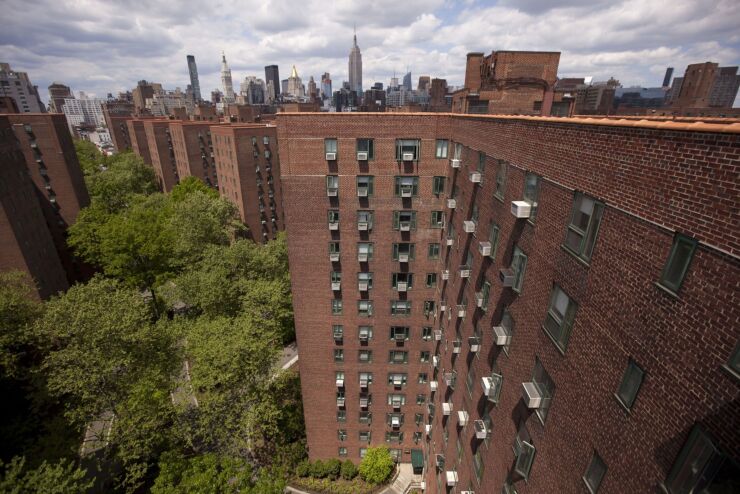WASHINGTON — Multifamily borrowers already have enough to cope with as the coronavirus renders many apartment tenants unable to make rent. But those borrowers face an additional threat of renters refusing to pay regardless of their financial situation.
The prospect of so-called rent strikes compounds the precarious position for apartment building owners during the pandemic. Borrowers of federally backed multifamily loans have some forbearance options provided by the government. But they are not as generous as the relief for single-family borrowers, and about half of multifamily loans are not federally backed.
The idea of a rent strike popped up in states such as California and New Jersey as renters have threatened to pause payments in solidarity with tenants who are unemployed or otherwise dealing with the economic effects. They argue that they should be granted the same pause in payments afforded to many mortgage borrowers.
But such a campaign could wreak further havoc on a mortgage system already strained by general liquidity concerns for servicers, and worries about how lenders will fare the longer the pandemic lasts.

“Refusing to pay your rent when you can afford it is like drinking poison and expecting your landlord to die,” said David Dworkin, president and CEO of the National Housing Conference. “Landlords who aren't getting forbearance may well lose their ability to provide basic services in buildings that desperately need them.”
The concept of rent strikes emerged as the April 1 payment due date approached. Although there is scant evidence that renters en masse declined to pay their monthly rent, there is some concern that the movement could gain steam by May 1, when it is likely that many more renters will feel economic effects of COVID-19 that have already forced more than 15 million Americans to file for unemployment.
Multifamily borrowers of government-backed loans, who own five or more units and suspend evictions during the pandemic, can request up to 90 days of loan forbearance (compared with one year for single-family borrowers) under the Coronavirus Aid, Relief and Economic Security Act. But tenant advocates say renters need additional protection.
“Freeze the bills or we won’t pay ‘em,” the Rent Strike 2020 campaign says on its website. Elsewhere on the site the group says, "They can't evict us all."
Supporters of the movement say the government should be providing more aid for those feeling a more direct impact from the economic shutdown.
“To me, the positive aspects of a rent strike are to push the political narrative to be more comprehensive, and to actually meet people where they're struggling the most,” said Pete Harrison, a candidate for the House of Representatives in New York’s 12th congressional district and a former senior adviser for housing at Data for Progress.
But rent strikes would worsen the economic situation for landlords and make them unable to pay their mortgage payments, leading housing professionals to plead with renters not to skip payments if they can afford them while also calling for government programs to help cash-strapped tenants.
The Biden administration once again extended the pause on student loan payments enacted to help borrowers during the COVID-19 pandemic, this time through the end of August.
The two states' combined plans amount to over $1.5 billion of the Homeowner Assistance Fund included within the American Rescue Plan Act , which was passed a year ago.
An uptick in pandemic-related payment suspensions reflecting new or restarted plan activity previously occurred as the omicron variant spread, but activity has since subsided.
The federal government can and should do more to help struggling renters, including granting the “maximum amount of forbearance possible” and implementing a rental assistance program, said Dworkin.
“Coming up with 60- and 90-day Band-Aids will only double the amount of work that everybody has to do,” he said. “From a mortgage perspective, this crisis is going to last at least a year."
A March 31
But in addition to threatening the multifamily mortgage system, rent strikes could upend the landlord-renter relationship, putting both sides in danger in the middle of a pandemic, said Dave Borsos, the vice president of capital markets at the National Multifamily Housing Council.
“There's an obligation for us to provide safe, decent housing, but there's also for our residents, on the same note, to the degree that they have the capacity to continue to pay rent or are currently employed that we're expecting them to continue to do that as well,” he said.
In addition to the CARES Act, agencies such as the Federal Housing Finance Agency and the Federal Housing Administration announced measures to provide some forbearance for multifamily borrowers.
In a statement, the FHFA said it is "continuously monitoring the coronavirus' impact on multifamily mortgage holders."
"As long as the national emergency period is still in place, borrowers of multifamily properties will be eligible to request COVID-19 forbearance," a spokesperson for the agency said.
Government-backed multifamily loans — which include mortgages backed by Fannie Mae, Freddie Mac and the Federal Housing Administration and Ginnie Mae — comprise about half of the multifamily mortgage market.
In addition to the options for borrowers of non-government-backed loans, some note that tenants in federally backed properties will still face risks the longer the pandemic the lasts.
Depositories hold about a third of multifamily mortgages, and while the bank regulators that supervise them have put out guidance to encourage forbearance, actual policies could vary from institution to institution.
If the forbearance period is up before renters are able to start working or find new jobs, it could result in people losing their homes, said Harrison. He supports canceling rent until the economy is back on solid footing.
“Whenever the ... back rent is due for people, and those landlords start triggering evictions and start kicking people out, particularly when it's unlikely the economy will respond quickly," it is "just going to be a second pandemic,” he said.
The longer people are out of work, the longer it is going to take them to make up months of missed rent payments, said Anne McCulloch, the president and CEO of the Housing Partnership Equity Trust.
“Think about how that's actually going to work, because the loss of income for the residents is going to cascade through the system,” she said. “Families of modest means who go without income for four weeks or longer are who most likely will be among the later people to be rehired.”
Yet others believe it’s simply too early on to know how much forbearance is appropriate for multifamily borrowers, especially because extended forbearance periods could threaten the financial standing of mortgage servicers.
“As of right now, a three-month moratorium at least gives everybody an ability to kind of step back and understand how deep … the impact is and the duration of the impact,” said Borsos.
Although many are pushing for more direct relief for renters, there is disagreement about what that relief should look like.
“There's a limited capacity among mortgage servicers that we have to be mindful of, and not double the amount of work that they're going to need to do, which is already overwhelming,” said Dworkin.
Rent strikes are “of course” a concern for the industry, said Borsos, though he added that his organization hasn’t seen them come to fruition just yet.
“We have a concern that some of the people in the industry, some of the people around and those from the rent strike are taking this as you don't have to pay [rent] because you can't be evicted, and so therefore don't pay even if you can,” he said.
Still, rent strikes could be a way to force the government’s hand, especially for desperate renters who aren’t feeling the effects of the stimulus package Congress passed last month, said Harrison.
“I think a rent strike is really a very practical tactic to get a larger concession from the political landscape that so far is not coming and that's going to rear its ugly head whenever this ends,” he said. “It just stands to reason that just canceling the liabilities initially is the actual easier thing to solve across the board.”
Others, including Dworkin, say that up to 12 months of loan forbearance for multifamily borrowers would be “an appropriate place to start.” McCulloch endorsed housing vouchers being tied to applications for unemployment insurance.
“I understand the impetus for the rent strike movement, but what I don't see is an easy answer for the mortgage finance system for the owners of affordable rental housing or for the residents,” said McCulloch.








